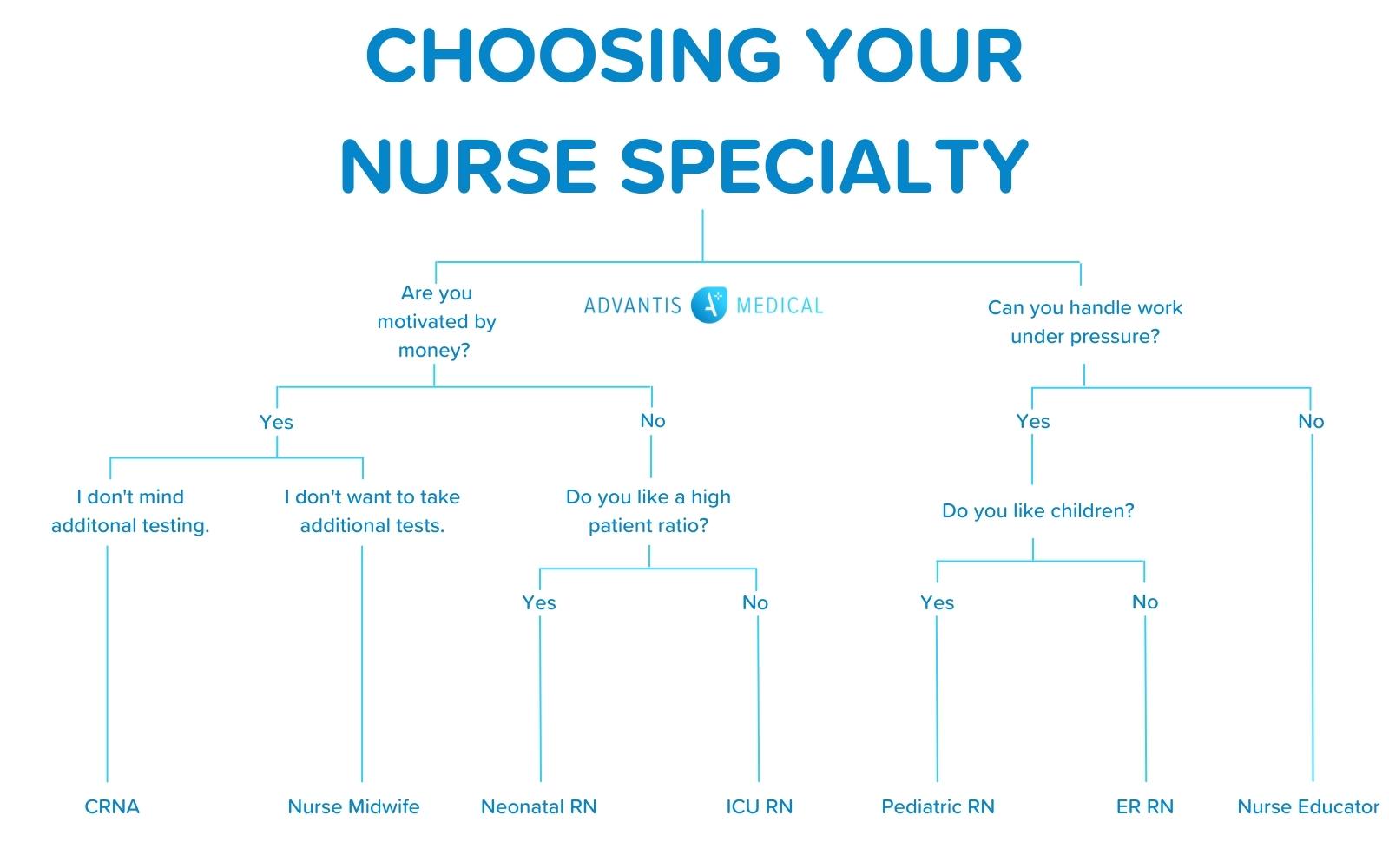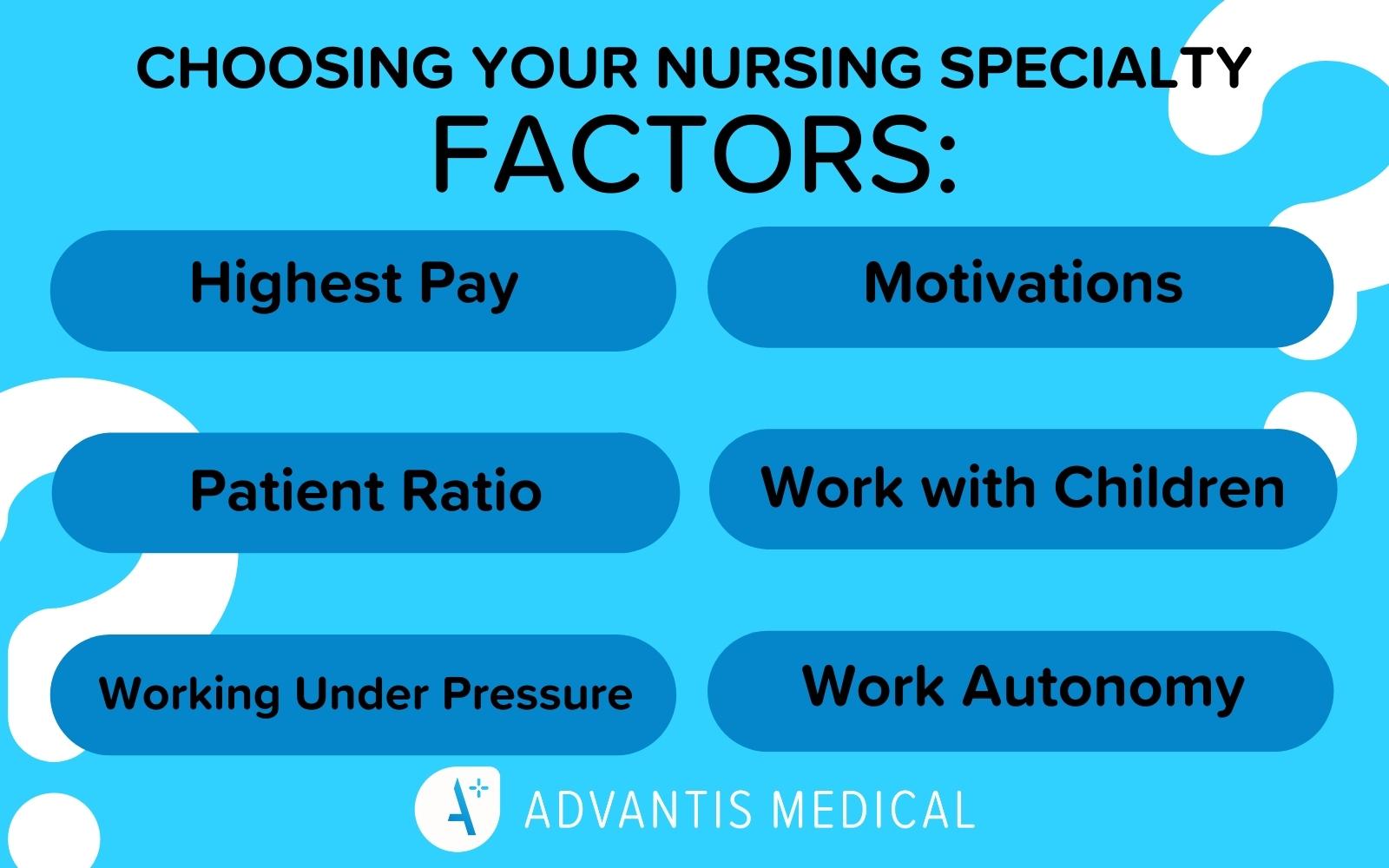New nurses have more options than ever to get started in this growing field. Whether you’re a brand new nurse or increasing your capacity with advanced nursing education, choosing a specialty is really important—it can make or break your career. Here are some things to consider when it’s time to choose a specialty!
Nursing Specialties Quiz: What interests you?
In nursing school, you’ll have the opportunity to put your nursing skills to the test at clinicals across many different specialties. You’ll also learn the differences between nursing specialties in your nursing classes. Each specialty has its own protocols and challenges.
For example, psychiatric nurses perform different duties than nurse educators and cardiac nurses. You’ll learn a lot of these details during your studies. Assessing your interest in each nursing specialty while you’re still in school is a great way to pick which one is best for you. Answer these nursing specialty quiz questions to help with your choice!

Are you motivated by money?
Certified Registered Nurse Anesthetists (CRNA) make over $180,000 each year on average, making it the highest paid nursing specialty by a long shot. Nurse Midwives come in second with average annual earnings around $115,000. If money is a primary consideration for choosing a nursing specialty, CRNA is a clear and obvious front runner.
Becoming a CRNA isn’t easy. You have to complete a nurse anesthetist program and pass the National Certification Exam. Starting in 2025, the Council on Accreditation will require a doctoral degree for new CRNAs.
Want to work with children?
Some people love working with children and others avoid it. In nursing practice, working with children can be especially challenging because they don’t understand medicine the same way adults do. If you don’t mind working with parents to calm a child who needs lifesaving medical treatment, the pediatric nursing specialty might be perfect for you!
Do you prefer a lower patient ratio?
Patients who are the most vulnerable often have more individualized care. Nurses in intensive care units (ICU) often have lower patient ratios than other kinds of nurses. This is because their patients are so medically fragile that they often need someone to monitor them very closely. If you think you’ll work better with a low patient ratio, consider working in the ICU!
Are you cool under pressure?
Emergency room (ER) staff are notoriously cool under pressure. They never know what they’re going to get. ER nurses work with doctors to treat people who are often having the worst day of their lives. These skilled nurses treat patients who experienced gunshot wounds, car accidents, heart attacks, strokes, and more. If you can handle the high pressure and unpredictable nature of working in the ER, this specialty is perfect for you!
What about autonomy?
Most nurses work under the direct supervision of a doctor. However, nurse practitioners are in a class all their own. They have advanced degrees that give them many of the same privileges of a doctor. Nurse practitioners often have their own patient loads and delegate tasks to nurses much like a doctor would. They have a level of autonomy that most other nurses don’t. If you’re a natural leader and prefer more autonomy in your work, you may find satisfaction as a nurse practitioner!
Do you like to travel?
As a result of the COVID-19 pandemic, travel nurses are making more money than ever. They’re highly skilled nurses who fill in at hospitals that are experiencing ballooning patient volume and/or staffing shortages. You can travel across the country or to a neighboring county or state to provide care on a contractual basis. Keep in mind that you can’t become a travel nurse until you have at least a year or two of experience!

Need a change?
The nursing specialty you choose after finishing your education isn’t set in stone. Nurses return to school or complete continuing education to switch into different specialties all the time. There are nurse specialty certifications for everything from diabetes management and acute care, to oncology and wound care. Or you can pursue travel nursing with Advantis Medical after getting some experience!
These nursing specialty quiz questions might inspire you! If you’re looking for a change in your career, look into different certifications, continuing education, and advanced practice degrees. You’re sure to find a nursing specialty to fall in love with all over again!









